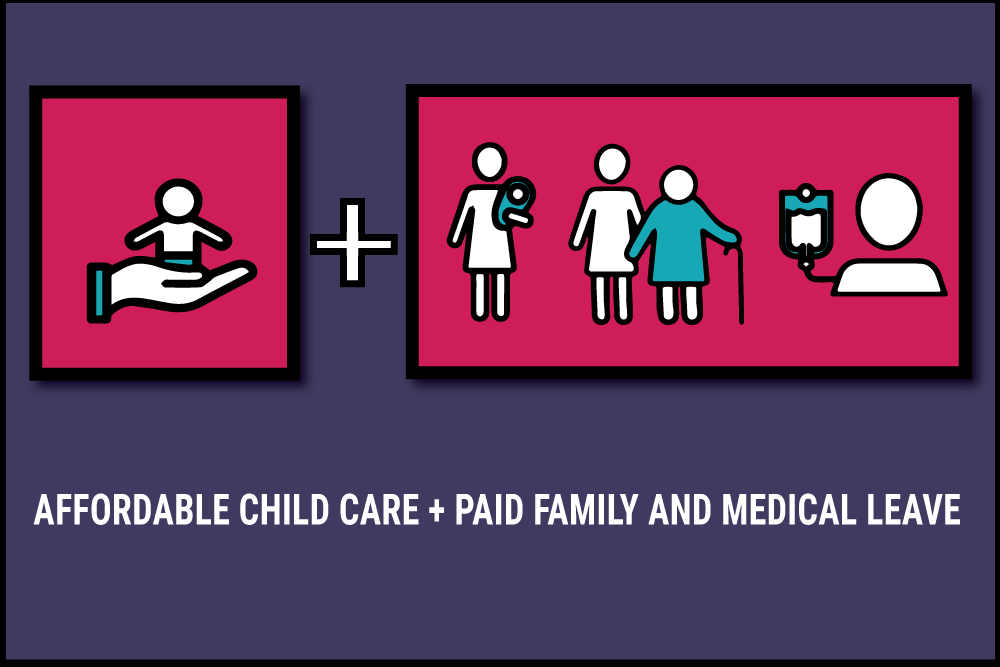
Two Issues Too Big to Ignore
COVID-19 Forced Affordable Child Care, Paid Family and Medical Leave Into Our Nation’s Collective Consciousness
The Colorado General Assembly came to an abrupt halt on March 14. It’s uncertain when it will resume, if it can be extended, or if legislation will need to be triaged before the session ends. What is certain is that two of WFCO’s long-standing policy priorities — access to affordable child care and paid family and medical leave – must be priorities for Colorado and our nation moving forward. Their economic impact is simply too big to ignore.
Too many women must choose between caring and providing for loved ones
Prior to the recess, we started to see progress on the state measures we support to strengthen the early care and education workforce as well as bring paid family and medical leave to Colorado workers. While progress has paused momentarily, the public health crisis forced these issues into our nation’s collective consciousness. COVID-19 is making it painfully clear that too many women and families must choose between caring for their loved ones or providing for them. Before COVID-19, 65 percent of Americans supported paid family and medical leave. It is likely this number is higher now.
The world changed significantly in a matter of weeks, but the systemic barriers that keep women from joining, remaining, and advancing in the workforce have not. The COVID-19 pandemic is shining a glaring spotlight on our nation’s systemic inequalities, resource gaps, vulnerable infrastructures, and the vast number of families teetering on the economic edge. Difficult choices families must make are multiplying. Similarly, the economic inequalities women face are magnified. One of the most significant ways we can make sure that these inequalities are addressed is by continuing our commitment to systemic change.
Ensuring state, federal recovery resources are women-centered
While the legislative session is on hold, WFCO took the following actions to ensure that state and federal recovery resources are women-centered in their approach.
- We signed onto a letter to Congress encouraging significant attention to and investment in the child care and early learning sector in its economic relief package. As part of that relief package, Colorado’s ECE sector will receive an estimated $41 million that may be used to address critical child care needs.
- We sent letters to Colorado Senators Gardner and Bennet urging support for the nonprofit sector and tax strategies to encourage giving to at this critical time.
- We contributed $10,000 to the Colorado COVID-19 relief fund and are leading a community voices committee to ensure the needs of Coloradans disproportionately impacted by the crisis are prioritized in grantmaking decisions. As the only statewide community foundation focused on the economic advancement of Colorado women, our intersectional gender lens expertise will be infused into the process. The fund is now open and eligible community-based organizations working on COVID-19 prevention, impact, and recovery may receive unrestricted general operating grants of up to $25,000. Mile High United Way will disperse funds within three business days of funding decisions for each cycle.
- We have given our WAGES grantees flexibility to use the funds they receive from us to meet the immediate needs of Colorado women and their families as they weather the economic fallout of the pandemic.
Women, marginalized communities will be impacted most by a COVID-19 driven recession
We know that without these critical interventions and support, existing inequities of women and other marginalized communities will be exacerbated long-term by a COVID-19 driven recession. Likewise, without national and state policy prioritization increasing access to child care and paid family and medical leave, all women will continue to experience economic inequality, pandemic or not.

